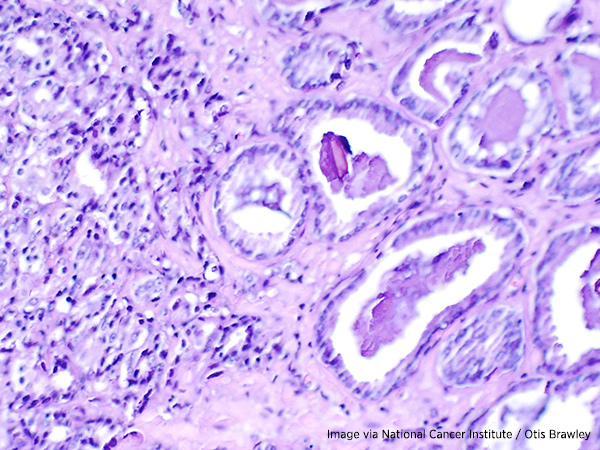New Combination Therapy for Metastatic Prostate Cancer
The FDA approved the DNA damage repair inhibitor olaparib, in combination with other therapies, for Castration-resistant or refractory prostate cancer
The U.S. Food and Drug Administration (FDA) has approved olaparib (Lynparza), in combination with abiraterone (Zytiga) and prednisone or prednisolone, for the treatment of patients with metastatic, castration-resistant prostate cancer whose tumors harbor certain mutations in the BRCA1 or BRCA2 genes.
BRCA1 and BRCA2 mutations, best known as drivers of some breast and ovarian cancers but found in many tumor types, disrupt one of the cell’s processes for repairing DNA breaks that occur in both strands of the DNA double helix. As a result, tumors accumulate mutations that may help them grow. When BRCA genes are mutated, cells rely on an alternative process to repair DNA.
Olaparib blocks the activity of this other DNA repair process, leaving BRCA-mutated cells with limited tools to repair DNA damage. This leads to excessive DNA damage and cell death of BRCA-mutated tumors.

Abiraterone is a drug that blocks the production of androgen hormones, which can drive prostate cancer growth. It is often given alongside the steroids prednisone or prednisolone to mitigate the side effects of androgen deprivation.
The approval of this drug combination was based on results from the phase III PROpel trial, in which 796 patients with metastatic prostate cancer who had not been treated with prior systemic therapy for their disease were randomly assigned to receive olaparib or placebo in combination with abiraterone and prednisone or prednisolone. All patients had undergone physical or chemical castration, during or after which their tumors progressed.
In the subgroup of 85 patients with BRCA mutations, the median progression-free survival was 8 months for those receiving placebo and not reached for those receiving olaparib. Patients in this subgroup treated with olaparib were also 70% less likely to die of any cause than patients treated with placebo.
Among the 711 patients without BRCA mutations, those treated with olaparib were 8% less likely to die of any cause than those treated with placebo, a difference that was not statistically significant. This suggests that patients with BRCA-mutated tumors are most likely to benefit from the olaparib regimen.
Prostate cancer accounts for 14.7% of all new cancer cases in the U.S. According to federal statistics, it was estimated that 288,300 individuals would be diagnosed with prostate cancer and 34,700 patients would die of the disease in the U.S. in 2023. Estimates of the proportion of prostate cancer cases that harbor BRCA mutations vary between around 10 to 20%.
The FDA rendered its decision on May 31, 2023.
